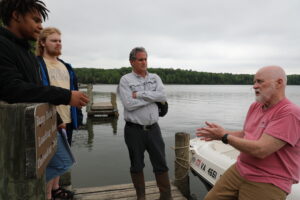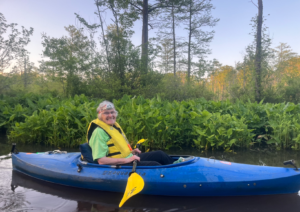Biennial Symposium
Image Credit: C.Gonzalez | CBNERR-VA/YRSCBR
Overview
Our biennial symposium, held in concert with CBNERR-VA and VIMS, brings together practitioners and residents throughout the York, Mobjack and Piankatank watersheds for a day of knowledge exchange and networking.
May 17, 2023
Our 2023 theme, Collaborative Science Driving Broader Impacts, begged the questions: Who does our science reach? How is it applied? What impact is it making? Check out the below for a look at the studies, approaches and programs featured this year, each creating ripple effects throughout the York watershed system.
View the program
View the agenda
Excellence in Environmental Education Awards
In concert with the Symposium, the Roundtable awards exceptional individuals who have made lasting impacts inspiring environmental literacy among all ages (one of the Roundtable’s primary goals).

2023 Excellence in Environmental Education Award
Presented to Harry Looney for his countless voluntary and dedicated efforts to raise awareness and spur action on water quality through the Lake Anna Civic Association (LACA) and its Water Quality and Environmental Preservation Committees.

2023 Lifetime Achievement Award
Presented to Teta Kain, “Empress of the Dragon” and “force of nature”, for making key and measurable contributions to both the natural world and “legions” of inspired stewards. Through environmental education, interpretation ,advocacy and stewardship, Teta’s efforts have helped bringing awareness to, and protection of treasured watershed habitat like the upper Piankatank River’s Dragon Run.
Read more about these regional “ripplemakers”.
2021 Awardees detailed here.
May 13, 2021
This year’s Narrative Science theme acknowledged the compelling tales of events, the anecdotes and the perspectives that surround regional science and science-based management and education. York River science is relatable, accessible and inspiring!
Presentations here.
Posters linked below:
Comparison of nutrient accrual in constructed living shoreline and natural fringing marshes – Randy Chambers
Controls of the diel variability in the York River carbonate system – Fei Da
Aquacultured – Lisa Lawrence
Forecasting the effects of sea level rise on tidal marsh habitats – Karinna Nunez
Use of by-catch reduction devices in the blue crab fishery – Madeline Reinsel
Transitioning an experiential field program to a virtual platform – Tara Rudo
Shoreline management BMP verification for Chesapeake Bay TMDL pollutant reduction credits – Aaron Wendt
Effects of spatial and temporal variations in subterranean estuary biogeochemistry and N processing rates on potential DIN discharge to the York River Estuary – Stephanie Wilson
